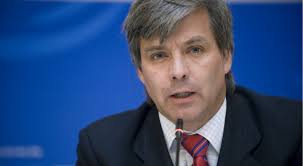By Andrew Warshaw
January 13 – Harold Mayne-Nicholls, the forgotten potential candidate in the FIFA presidential election campaign, says he will not make up his mind whether to stand until the last moment.
Former head of the Chilean football federation and the man who led the FIFA technical inspection team that assessed all nine candidates for the 2018 and 2022 World Cups, Mayne-Nicholls has been conspicuous by his silence as attention focussed on prince Ali bin al-Hussein’s announcement that he will run against Sepp Blatter and, most likely, Jerome Champagne.
The January 29 deadline for candidates to officially join the race is closing in and in emailed correspondence with Insideworldfootball, Mayne-Nicholls, who was due to have made a decision in the New Year, says he wants assess next week’s European Parliament debate on FIFA’s future before committing himself.
“I will wait until the last moment,” he said. “The more time I have and the more information I get will help my final decision.”
Mayne-Nicholls has been quietly taking soundings behind the scenes to gauge how much support he might receive, especially within UEFA.
“I have been in some meetings with Presidents from European Associations, and those meetings went very well,” he said. “We agree on some crucial aspects. The main one: FIFA must change.”
Lurking in the background is the fact that Mayne-Nicholls is under investigation by FIFA’s ethics committee into his conduct during the 2018 and 2022 bid process. He says he has heard nothing new about the investigation but last month told this website FIFA were wasting “energy, money and time” on his case and that he had done “nothing immoral” in seeking unpaid internships for members of his family at Qatar’s famed Aspire Academy.
Meanwhile, in an open letter to the international media, Mayne-Nicholls revisits the issue of exactly when to hold the Qatar World Cup, taking each of the three likely scenarios in turn and warning how a winter tournament would cause massive disruption.
Hosting the tournament in November and December, the date favoured by FIFA, can only take place if it concludes by December 22 because of Christmas and only if leagues across the world stop playing in early November so that players have time to prepare. But this would throw up huge logistical problems, he says.
“At the last two World Cup finals, players from 57 different leagues participated in South Africa 2010 and 55 in Brazil four years later. Of these only one (Canada) does not play any matches in November. Obviously, to opt for these dates will have an adverse affect and disrupt at least 50 leagues.”
Commenting on the January-February option, Mayne-Nicholls writes: “Many leagues have a period of recess in January (either winter breaks or summer holidays) but again the suspension of domestic competitions will still affect countries like England, Spain, Italy and some countries in the southern hemisphere. The increasing international importance and profile of the Super Bowl (and its lucrative television and advertising contracts) across the world, means that to avoid conflict the final in Qatar could be played Saturday 12 February.”
The third alternative would be to play from May 5 to June 5 but European leagues would have to end by April 17 while the temperature in Qatar would still be ferocious, he says.
“Last year, during the same dates, the minimum was 25 degrees on May 7 and maximum of 48 degrees on May 28. If FIFA decide to play in May and June, the Qataris must ensure their stadiums (pitch and grandstands) are refrigerated as they promised without using fossil fuels (organic solution). This will allow players and audience to enjoy the action in the evenings. (Does anyone know what are the health consequences of playing in artificially cooled conditions under direct sunlight?). But with this option, what do we do with thousands of visiting fans who will be visiting the emirate, during the hot daylight hours? This is a major issue that needs to be solved.”
FIFA’s 2022 World Cup Task Force comprising all the various stakeholders is next due to meet towards the end of February with a firm decision on dates for Qatar expected the following month. But Mayne-Nicholls says it has dragged on for far too long. “After four years of knowing they need to figure out a plan, FIFA are yet to offer a solution.”
Contact the writer of this story at moc.l1744917824labto1744917824ofdlr1744917824owedi1744917824sni@w1744917824ahsra1744917824w.wer1744917824dna1744917824

